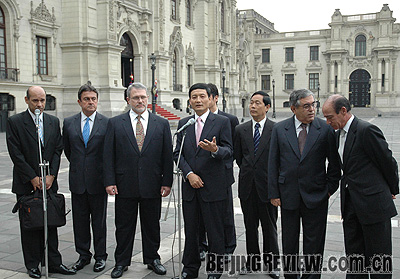| Now seems to be a good time for Chinese companies to make overseas forays. Their solid financial grounding and a stronger yuan are paving the way for them to step up onto the world stage. Meanwhile, their financially strained Western counterparts may also welcome an infusion of Chinese capital. Chinese regulators have taken a further step to help domestic companies expand abroad by making it easier for them to invest in overseas companies.
 |
|
MINING OVERSEAS: China Aluminum Corp. signs an agreement in May 2008 with Peru Copper Inc. to exercise an option to develop the Toromocho mining project in the Andean country (LIU GUOQIANG) | On March 16, the Ministry of Commerce (MOFCOM) said it was loosening its controls on overseas investment by local companies and streamlining application approval procedures. Starting from May 1, the ministry will transfer approval power for overseas investments worth less than $100 million to provincial or lower-level commerce authorities. It will only retain a say on deals worth $100 million or more or ones that are particularly important or sensitive.
Besides this, commerce authorities at all levels will simplify their application procedures to shorten review periods and provide more convenient and relevant services to enterprises. For example, the MOFCOM will improve its online system to accept applications and extend approval certificates via the Internet.
With the new rules coming into play, the government has gradually put in place a complete regulatory framework for overseas investments, pumping steam into a wave of Chinese capital heading offshore. In the past few years, a rising number of Chinese firms have been investing in everything from Greek ports to South African banks. Energy and natural resources companies have been at the top of their lists. The latest case in point is China Aluminum Corp.'s $19.5-billion bid for minority stakes in debt-ridden Australian miner Rio Tinto Group's prime iron ore, copper and aluminum assets. China Minmetals Non-Ferrous Metals Co. Ltd., the country's major metals group, is also currently pursuing Australia's OZ Minerals Ltd., the world's second largest zinc ore producer.
The investment spree is believed to be driven by the rising strength of Chinese companies that look for greater returns and risk diversification away from the domestic market, as well as a growing need for the country to access foreign expertise and secure long-term energy supplies.
According to the MOFCOM, the value of the country's foreign direct investments (FDI) reached $52.15 billion last year, a dizzying increase of 96.7 percent year on year. But this amount was far outweighed by the inflow of foreign funds. China's actual use of FDI jumped a yearly 23.58 percent to $92.4 billion in 2008, making it the world's biggest recipient of foreign investment.
Analysts believe the new regulations represent a government effort to help the country's backbone enterprises make a push into international markets. They will add incentives for local enterprises to look abroad for expansion opportunities and participate in global competition, they said. The regulations also help take pressure off the financial system from massive capital inflows and strike a balance of payments, said Yao Jian, a MOFCOM spokesman, at a recent press conference in Beijing.
"More importantly, it is an anticipated boon for the economy bearing the brunt of the global downturns," Yao said. "Outbound activities in industries are bound to boost exports of equipment and raw materials and create more jobs, as well as help offset the domestic downturns."
Xing Houyuan, Director of the MOFCOM Research Center for Overseas Investments, echoed Yao's opinion. Chinese enterprises could sharpen their competitive edge as they internationalize their businesses, he said in an interview with Xinhua News Agency. Meanwhile, the new rules signal a step-up in the ambition of policy makers to merge into international markets and make full use of global resources, she added.
Once bitten, twice shy
But two basic challenges facing many Chinese companies are their weakness in crafting long-term strategies and a tendency to underestimate market risks. They also lack experience in cross-border management and branding. Sometimes the cost of their inexperience has been painful.
Expansion-minded Chinese companies recently lost tens of billions of dollars in a string of high-profile foreign deals just before the financial storm started to surge through global markets. Among them were the country's sovereign wealth fund, China Investment Corp., which suffered a paper loss of nearly $2 billion from its investment in The Blackstone Group LP of the United States in 2007, and home appliance giant TCL Corp., which incurred heavy losses in European markets after purchasing the mobile phone business of French telecommunications equipment maker Alcatel SA in 2004.
| 